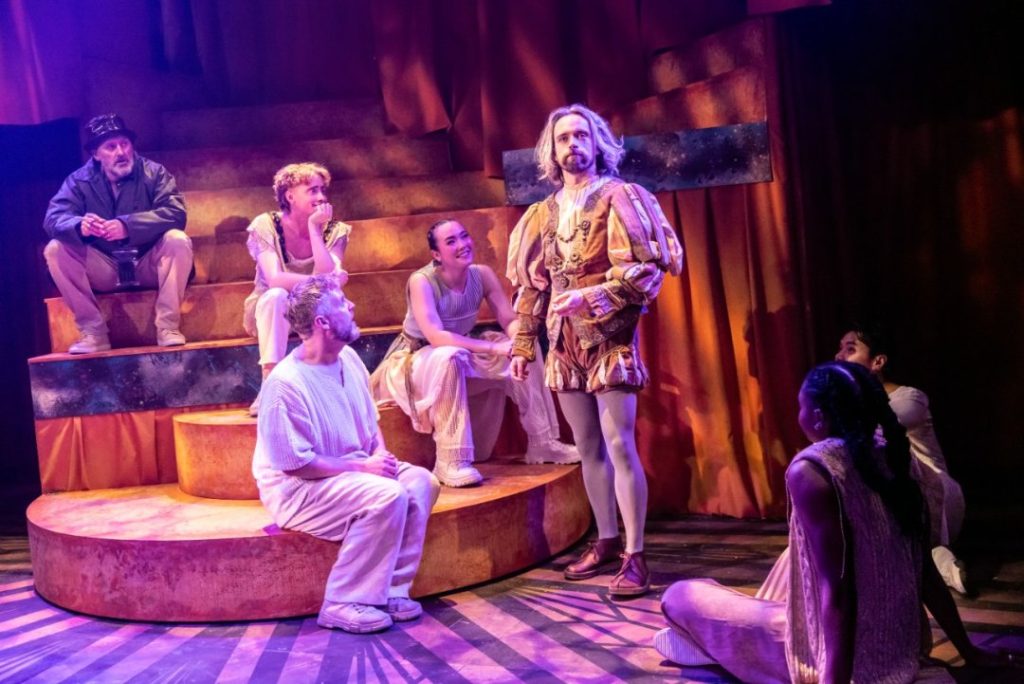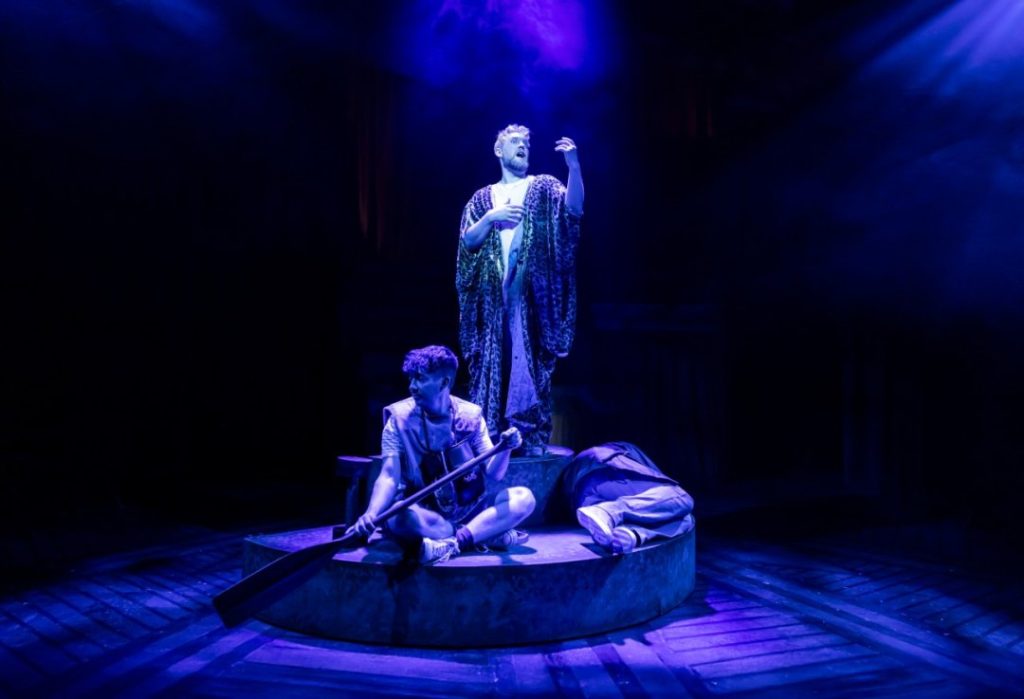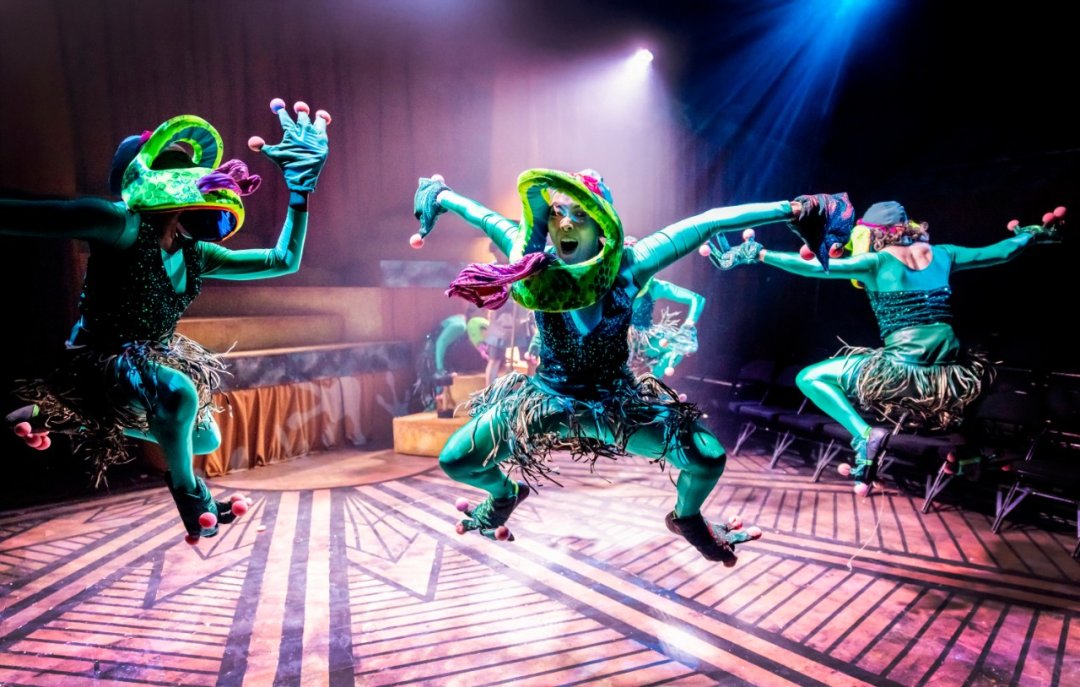The Frogs, Stephen Sondheim’s rarely revived musical, is back in London. This production, directed with a knowing wink by Georgie Rankcom, offers a riotous, if unwieldy, journey through the underworld.
The Frogs is a musical comedy with a lineage as odd as its premise. Originally penned by Aristophanes in 405 BC as a satirical play, it was reimagined in the 1970s by Burt Shevelove and Stephen Sondheim, then expanded for Broadway by Nathan Lane. It’s a show that wears its meta-theatrical heart on its sleeve, riffing on everything from classical Greek drama to reality TV, and peppered with Sondheim’s trademark lyrical wit. The Southwark Playhouse staging is presented by The Grey Area, following their acclaimed Anyone Can Whistle, and features original direction and choreography by Susan Stroman, with orchestrations by Jonathan Tunick.
The story opens with Dionysos, god of wine and theatre, despondent over a world riven by division and despair, a not-so-subtle nod to our own times. Accompanied by his long-suffering servant Xanthias, Dionysos embarks on a journey to Hades in search of a playwright who can restore hope to humanity. Their mission: bring back George Bernard Shaw or William Shakespeare, whichever can best argue for the saving power of art.

Their path is anything but straightforward. At the River Styx, they’re confronted by a chorus of frogs, no ordinary amphibians, but creatures fiercely resistant to change, croaking their allegiance to the status quo. The frogs’ raucous, repetitive musical numbers set the tone for the show’s blend of absurdity and social commentary. Once in the underworld, Dionysos arranges a debate between Shaw and Shakespeare, staged as a kind of mythic X Factor, with the fate of civilisation hanging in the balance. The result is a series of verbal and musical duels, brimming with clever references to both playwrights’ works and the enduring question: can art really save us, or are we doomed to keep croaking in our own mud?
Dan Buckley, as Dionysos, leads with a blend of befuddled gravitas and comic timing. He’s a god in crisis, by turns pompous and endearing, and Buckley’s performance grounds the show’s wild flights of fancy. His chemistry with Kevin McHale’s Xanthias is a highlight; McHale, best known from Glee, brings a droll, contemporary edge to the role, his asides and eye-rolls providing a much-needed anchor amid the show’s zanier moments.
Joaquin Pedro Valdes as Herakles delivers swagger and physical comedy, while the rotating cast of Plutos (including Victoria Scone and Danielle Steers) injects each underworld scene with fresh energy. Bart Lambert’s Shakespeare and Martha Pothen’s Shaw are both sharply drawn, their duelling philosophies rendered with wit and musical verve. The ensemble, including Milo McCarthy and Evonnee Bentley-Holder, throw themselves into the amphibian antics with gusto, their commitment making even the silliest moments sing.
For all its cleverness, the show sometimes struggles to maintain momentum. Despite Nathan Lane’s efforts, it feels more like a series of skits than a cohesive narrative. The result is a production that is overlong and episodic, much like a variety show that refuses to end its final number.

The five-piece band, under the musical direction of Yshani Perinpanayagam, brings Sondheim’s complex score to vibrant life. The orchestrations are lush yet playful, with nods to everything from Gilbert and Sullivan to My Fair Lady, a reminder that Sondheim, even in his lesser-known works, is always in conversation with the greats.
The audience’s emotional journey mirrors Dionysos’s own: what begins as a lark grows gradually more contemplative. The laughter is genuine, especially for those in on the theatrical in-jokes, but by the final scenes, you’re left pondering whether change is ever truly possible, or if we’re all just frogs, croaking the same tune. On press night, the house was full of theatre folk, their laughter tinged with recognition; for a general audience, some of the esoterica may fly overhead.
Frogs is as lively and inventive as the mediocre material allows. Rankcom’s staging finds more coherence than the 2004 Broadway revival, and the cast’s commitment recalls the ensemble spirit of Sondheim’s best works. There are echoes of Spamalot’s irreverence and the meta-theatricality of Noises Off, but with a philosophical bite all its own.


